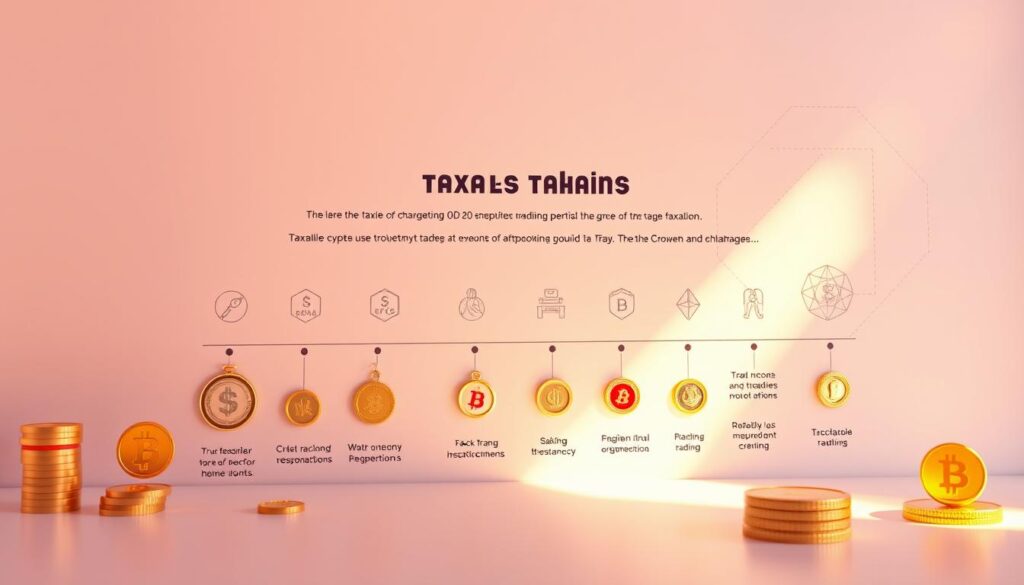Cryptocurrency investments have their own tax rules. The IRS sees crypto as property, not money. This means how you report gains and losses under cryptocurrency tax rules is different. Not following these rules can lead to fines, so it’s key to understand crypto tax brackets well.
Key Takeaways
- U.S. tax laws classify crypto as property, affecting how gains are taxed.
- Failure to report crypto transactions risks legal and financial consequences.
- Short-term and long-term rates in crypto tax brackets differ significantly.
- Staying updated on cryptocurrency tax rules protects against regulatory changes.
- Proper reporting strategies help maximize returns while avoiding penalties.
The Basics of Cryptocurrency Taxation
Understanding tax treatment of virtual currencies starts with the IRS’s foundational rules. Cryptocurrencies like Bitcoin or Ethereum are taxed as property, not money. This means every trade, sale, or exchange triggers taxable events under IRS guidelines for crypto taxes.
How the IRS Views Digital Assets
In 2014, the IRS issued Notice 2014-21, defining virtual currencies as property for tax purposes. This classification means gains or losses from crypto transactions are reported as capital gains or losses. Whether you trade crypto or use it to buy goods, the IRS treats it like selling stocks or real estate.
Property vs. Currency: The Critical Distinction
- Currency: Used to buy things without inherent value beyond transaction use.
- Property: Assets with value that can appreciate/depreciate, taxed on gains/losses.
This distinction affects how transactions are reported. Swapping Bitcoin for Ethereum, for example, counts as a taxable event because it involves property exchanges.
Virtual Currency Notice 2014-21 Explained
The 2014 guidance requires taxpayers to track cost basis, fair market value, and taxable events. Since 2014, the IRS has updated rules for mining, staking, and DeFi activities, but the core principle remains: crypto is property. Failure to comply risks audits or penalties.
Understanding Crypto Tax Brackets in the United States
Getting to know understanding crypto tax brackets is crucial for reducing taxes. The federal government divides gains into short-term and long-term. This affects how taxes are figured out.
Short-term vs. Long-term Capital Gains Rates
Got crypto for less than a year? Those gains are taxed like regular income. For example, if you’re in the 22% tax bracket, you’ll pay 22% on short-term gains. But, if you hold it over a year, you get lower rates from 0% to 20%, based on your income. If you’re married and make less than $83,350 in 2023, you might not pay anything.
Income Tax Brackets for Crypto Mining and Staking
Mining and staking income is seen as regular income. So, it’s taxed at your highest rate, up to 37%. You also have to pay self-employment taxes (15.3%) if it’s a business. For instance, $10,000 mined for fun? It’s taxed at your income rate. But, if it’s for business, you’ll have to add self-employment taxes.
State-level Considerations for Crypto Taxation
States have different rules. California follows federal rules, taxing gains at state rates. Wyoming, on the other hand, has no state income tax, making it good for crypto. Always check your state’s rules to avoid surprises.
How Cryptocurrency Gains and Losses Are Calculated
Calculating crypto gains starts with knowing your cost basis. This is the original price you paid for each asset plus any fees. Every transaction, from buying to trading, needs to be recorded accurately. This ensures you can figure out taxable profits or losses.
Missing details like exchange fees or trade dates can lead to errors. These errors can affect how much you owe in crypto taxes.
- First-In-First-Out (FIFO): The IRS default method uses the oldest assets first to calculate gains.
- Last-In-First-Out (LIFO): Taxes newer assets first, but it’s not IRS-approved for crypto.
- Specific Identification: Choose exact coins sold to optimize tax outcomes. This method requires detailed records.
Tracking transactions across different platforms can be tricky. Without precise data, it’s hard to match buy and sell events. For instance, selling 2 ETH bought at $2,000 and $4,000 using Specific Identification can lower taxable gains. This is compared to using FIFO.
Transaction fees are part of the cost basis. A $10 fee on a $5,000 purchase makes the basis $5,010. This reduces taxable profit. Ignoring fees can make reported gains higher, increasing tax liability.
Tax software like CoinTracking or Koinly can help with calculations. But, without consistent record-keeping, manual errors can still happen.
Taxable Events Every Crypto Investor Should Know
It’s key to know about taxable events in crypto trading to follow crypto tax regulations. Many investors miss out on tax duties from daily actions. Here are important scenarios to watch:

Selling Crypto for Fiat Currency
When you swap Bitcoin, Ethereum, or other cryptos for U.S. dollars, it’s taxable. The profit from these sales is taxed as capital gains, depending on how long you held it.
Trading One Cryptocurrency for Another
Trading one crypto for another, like swapping Bitcoin for Ethereum, is also taxable. The IRS sees this as selling the original asset. You must calculate gains using the asset’s fair market value at the time of the trade.
Purchasing Goods or Services with Cryptocurrency
Using crypto to buy things, like coffee, is taxable. The taxable gain is the difference between the crypto’s purchase price and its value at the time of the purchase.
Mining and Staking Rewards
Rewards from mining or staking are taxed as ordinary income at their fair market value on the day you get them. Selling these later may also lead to capital gains taxes, creating a double tax burden.
These examples show how crypto tax rules apply beyond just selling. Keeping good records and doing regular audits can help avoid fines. Stay up to date with IRS rules and plan your taxes wisely.
Non-taxable Crypto Transactions to Be Aware Of
Knowing cryptocurrency tax rules helps investors avoid extra reporting. Some actions won’t lead to crypto tax implications. IRS guidelines in this guide say certain activities are tax-free until certain actions happen.
Buying and Holding Cryptocurrency
Buying crypto with regular money isn’t taxed. Holding it long-term doesn’t trigger taxes right away. Taxes come into play when you sell or exchange it, as IRS rules state.
Transferring Crypto Between Your Own Wallets
Switching crypto between your wallets (like from an exchange to a hardware wallet) isn’t taxed. You still need to keep records for cost basis tracking. But, no gains or losses are reported for these moves.
Donating Cryptocurrency to Qualified Charities
Donating appreciated crypto to approved charities can dodge capital gains taxes. Donors can deduct charitable contributions based on the asset’s value at donation time. This reduces taxable income and follows IRS guidelines.
IRS Guidelines for Reporting Cryptocurrency on Your Tax Return
The IRS has strict rules for reporting crypto transactions under IRS guidelines for crypto taxes. All taxpayers must say “Yes” to the Form 1040 question about virtual currency activity. This is true even if no gains were made. Not following these rules can lead to audits and penalties.
- Form 8949/Schedule D: Report capital gains/losses from sales, trades, or exchanges.
- Schedule C: Required for crypto mining/staking treated as self-employment income.
- Record-Keeping: Track dates, amounts, and transaction details to meet crypto tax regulations.
Not following the rules can result in big fines. You could face 20% accuracy-related fees or 50% failure-to-file fines for Form 8949. The IRS now uses blockchain tracking tools to check crypto traders. This shows how serious they are about following the rules.
Keep up with the latest IRS guidelines for crypto taxes. Make sure to track all your transactions and keep records. Reporting accurately is key to avoid legal trouble. Ignoring these rules can lead to audits, fines, and even legal action under the updated crypto tax regulations.
Form 8949 and Schedule D: How to Report Crypto Transactions
Understanding cryptocurrency tax rules is key to reporting crypto trades. You need to know how to use IRS forms 8949 and Schedule D. These forms help track your gains, losses, and taxable events in crypto trading. They make sure you follow the law.
Step-by-Step Reporting Process
Here’s how to fill out your tax forms:
- Record all taxable crypto events on Form 8949. Include dates, cost basis, and proceeds for each deal.
- Split short-term and long-term trades on Form 8949. Then, move totals to Schedule D’s Part I or II.
- Attach both forms to your 1040 tax return.
Common Mistakes to Avoid When Filing
Stay clear of these mistakes to dodge audits and penalties:
- Don’t ignore small trades or gifts, even if they’re under $600.
- Be careful not to confuse cost basis for similar trades.
- Remember the wash sale rule for buying back crypto within 30 days.
- Always report crypto exchanges for goods or services as taxable events.
Special Tax Considerations for Crypto Miners
Crypto miners have special crypto tax implications to deal with. The IRS sees mining rewards as taxable income. This income is based on the cryptocurrency’s market value when mined. It’s treated as ordinary income, which means it’s taxed at federal, state, and self-employment rates.
Miners also have to follow crypto tax regulations. These rules help tell apart hobby mining from running a business.

Whether mining is seen as a business or a hobby affects taxes. The IRS looks at how much time you spend mining, your profit history, and your goals. If you mine as a business, you can deduct things like hardware costs, electricity bills, and software fees.
You also need to track how much your equipment is worth over time. This is called depreciation.
- Key Deductions: Hardware, energy, internet, and maintenance costs
- Business Structures: Forming an LLC or S-corporation may reduce liability and offer tax advantages
- Record-Keeping: Detailed logs of mined coins, expenses, and income dates are required for audits
Recently, the IRS has made it clear that miners must follow the rules closely. Miners must report all rewards every year, even if they haven’t spent the coins yet. Not following these crypto tax regulations can lead to penalties.
Using tax software for crypto can help with calculations. But, it’s wise to talk to a tax expert to make sure you’re following all the rules.
DeFi Taxation: Navigating the Complexities of Decentralized Finance
Decentralized finance (DeFi) brings new tax challenges. People need to know how yield farming and liquidity pools fit into understanding crypto tax brackets. DeFi transactions often lead to multiple taxable events, making tracking important.
Yield Farming and Liquidity Pools
- Rewards from yield farming are taxed as income when received
- Adding or removing assets in liquidity pools creates taxable events
- Impermanent loss may not offset gains for tax purposes
Token Rewards and Interest
Token rewards from staking or protocol incentives are taxed as income. Interest earned in DeFi platforms must be reported right away. Different token types (utility vs. governance) may need separate calculations.
Flash Loans and Tax Implications
Flash loans—short-term, collateral-free loans—create taxable events if tokens change hands. Even brief transactions may trigger reporting requirements under IRS rules. There’s no clear guidance, so keeping detailed records is key.
DeFi’s changing landscape raises many questions. Taxpayers should talk to experts to stay up-to-date with crypto tax regulations. Being cautious and keeping thorough records is crucial to avoid penalties in this uncertain area.
NFT Tax Implications: A Growing Concern
NFTs, or non-fungible tokens, are subject to crypto tax implications under U.S. tax law. The IRS views most NFTs as property. This means sales and trades can lead to taxable events in crypto trading. Investors must keep track of purchases, sales, and other activities to follow reporting rules.
- Selling an NFT for a profit creates a capital gain, taxed at property rates.
- Creating or minting NFTs doesn’t count as taxable income unless sold.
- Royalties earned from NFT sales may qualify as ordinary income, not capital gains.
NFTs used for collectibles face higher tax rates. Long-term gains on collectibles could hit 28%, exceeding standard capital gains rates. The IRS hasn’t issued final rulings, leaving uncertainty about how certain transactions will be classified. Taxpayers should document every transaction, including purchase price, fees, and sale details.
Creators and investors must stay informed as regulations evolve. Consult tax software or advisors familiar with crypto tax implications to avoid penalties. NFTs blur traditional tax categories, making accurate record-keeping critical.
Tax-Loss Harvesting Strategies for Cryptocurrency Investors
Using tax-loss harvesting can help lower your taxes on cryptocurrency gains. It works by selling coins at a loss to offset your gains. Here’s how to do it right:
Timing Your Crypto Sales for Tax Efficiency
- Sell losing positions before December 31 to lock in losses for the tax year.
- Monitor market cycles to identify dips when prices are lowest.
- Avoid triggering calculating crypto gains by holding assets long-term to qualify for lower long-term rates.
Offsetting Gains with Losses
Losses from crypto sales can offset up to $3,000 of ordinary income each year. Any extra losses can be carried forward forever. For instance, a $10,000 loss on Ethereum could reduce your taxable income by $3,000 in 2023. The remaining $7,000 can be used in future years.
Wash Sale Rule Considerations
IRS rules say you can’t claim losses if you buy the same security within 30 days. This rule is for stocks, but crypto’s status is unclear. New capital gains taxes on cryptocurrency rules might help. Always check with experts before buying back sold assets.
Record-Keeping Best Practices for Crypto Investors
Keeping accurate records is key for understanding crypto tax brackets and calculating gains. Track every transaction with details like date, type, amounts in crypto and USD, and who you traded with. Missing data can cause errors during tax season.

- Specialized crypto tax software (e.g., CoinTracking, Koinly)
- Excel/Google Sheets for manual entries
- Exchange export files (CSV downloads)
When using many platforms, merge records every quarter to avoid confusion. Old transactions on closed exchanges need extra work—contact support or save screenshots. Good records help spot deductible losses and track holding periods for better rates.
Tools like blockchain explorers check transaction hashes, while tax software automates calculating crypto gains across wallets and exchanges. Regular backups keep data safe from technical problems. Without organized records, you risk audits, penalties, or missing out on savings.
Tax Software and Tools Specifically Designed for Cryptocurrency
Managing cryptocurrency taxes needs special tools. These tools help with cryptocurrency tax rules and calculating crypto gains. But, users must check the results themselves.
Popular platforms make it easier. They import data and fill out forms for you. This helps avoid mistakes.
Popular Crypto Tax Calculation Platforms
Here are some top platforms:
- CoinTracker: Supports 300+ exchanges, tracks DeFi activities, and starts at $39 annually.
- TokenTax: Handles complex trades with plans from $29 to $149, based on transaction volume.
- CryptoTrader.Tax: Focuses on audit-ready reports, priced at $50 for basic users.
- Koinly: Tracks portfolios and generates IRS forms, with pricing from $29 to $69 per year.
Features to Look for in Crypto Tax Software
Look for these features:
- Automated data import from major exchanges.
- Support for DeFi transactions like liquidity pools.
- Flexible accounting methods (FIFO, HIFO).
- Export options for IRS forms 8949 and Schedule D.
- Notifications for tax-loss harvesting opportunities.
Even with these tools, challenges remain. Cryptocurrencies and DeFi are always changing. Software updates try to keep up, but users must still double-check.
Dependence on automation can lead to errors. This is especially true for complex strategies like staking or yield farming.
Working with Tax Professionals Who Understand Cryptocurrency
Managing crypto taxes needs more than just basic tax help. Regular accountants might not know about crypto tax rules, like DeFi or NFT sales. To avoid mistakes, find experts who focus on digital assets.
- Look for CPAs or Enrolled Agents certified in cryptocurrency taxation
- Verify experience with platforms like Coinbase, Binance, or decentralized exchanges
- Ask about knowledge of IRS notices like 2014-21 and recent court rulings
Prepare questions to check their knowledge: “How do you handle DeFi staking rewards?” or “Can you explain NFT sale reporting rules?” Don’t choose generalists. They should know about crypto-specific topics like hard forks or airdrops. Bring all your transaction records to make meetings easier. Messy data can raise costs and risks.
Specialized advisors might cost more, but they help avoid fines. If you have complex assets, like many trades or yield farming, you need experts. They track every crypto tax detail. Choosing the right expert saves you money and keeps you in line with the law.
The Consequences of Failing to Report Crypto Taxes
Ignoring IRS guidelines for crypto taxes can lead to serious legal and financial fallout. The IRS views virtual currencies as property under tax law. This means every transaction is subject to tax treatment of virtual currencies. Not reporting gains or losses can lead to audits, penalties, and even criminal charges.
Penalties start at 25% of unpaid taxes and can go up to 75%. Interest is added daily to unpaid balances. This turns small mistakes into big financial burdens.
- Penalties: Not reporting crypto profits leads to automatic fines and interest charges.
- Audits: The IRS uses blockchain tools to track transactions, finding discrepancies.
- Criminal charges: Intentional evasion can result in prison time under federal tax laws.
IRS Enforcement Actions and Penalties
In 2023, the IRS increased enforcement, focusing on unreported crypto income. Penalties include:
- 20% late-filing fee
- Accuracy-related penalties up to 20%
- Criminal prosecution for intentional violations
The Coinbase Case: A Precedent for Compliance
In 2022, the IRS used a John Doe summons to get data from Coinbase, revealing millions of users. This case showed that exchanges must report large transactions. Now, the IRS asks about crypto on Form 1040, leaving no room for oversight.
Tools like KoinX help track trades to avoid errors. Non-compliance risks are much higher than any privacy benefits. The IRS’s focus on crypto will not ease—compliance is essential to avoid severe consequences.
Staying Ahead of Evolving Crypto Tax Regulations
Crypto tax rules are changing as new tech emerges. In the US, taxpayers need to keep up with updates. This includes new broker reporting rules and changes to the wash sale rule for digital assets.
These changes help make sure virtual currencies are taxed correctly. They follow IRS rules closely.
To stay on top, it’s important to watch IRS notices and debates in Congress. The IRS often updates its guidance on reporting. So, it’s crucial to check regularly.
Subscribing to alerts from tax agencies and crypto news sites is also helpful. This way, investors can quickly adjust to new rules.
Using systems that track transactions in real time is a good strategy. Working with tax experts who know the latest laws is also smart. This ensures your tax filings are correct.
For those with crypto on foreign exchanges, knowing about foreign account reporting is key. This avoids penalties.
Even with uncertainty, taking steps like tax-loss harvesting and keeping good records helps. Learning about crypto tax rules and how virtual currencies are taxed is empowering. It lets investors handle changes with confidence.
Being alert and informed is essential. It helps you stay in line with the fast-changing crypto tax world.
FAQ
How does the IRS view cryptocurrencies for tax purposes?
The IRS sees cryptocurrencies as property, not currency. This means you have to follow property rules when dealing with crypto. It affects how you pay taxes on crypto gains.
What are the main taxable events in crypto trading?
Taxable events include selling crypto for regular money, trading one crypto for another, and using crypto to buy things. Also, getting mining and staking rewards can trigger taxes. Each event has its own tax rules under IRS guidelines.
What are the different tax brackets applicable to cryptocurrency investments?
Crypto investments can face short-term or long-term capital gains taxes. Short-term gains are taxed like regular income. Long-term gains have lower rates. Mining or staking income is taxed as regular income.
How do I calculate taxable gains and losses on my cryptocurrency transactions?
To figure out gains and losses, know your cost basis for each crypto. Don’t forget transaction fees. The IRS lets you use methods like FIFO or LIFO, which can change your tax.
Are there any non-taxable crypto transactions I should be aware of?
Buying and holding crypto, transferring it between wallets, and donating it to charities are not taxed. But, keeping good records is still important for future taxes.
What are the IRS guidelines for reporting cryptocurrency on my tax return?
The IRS wants you to report crypto on Form 1040, even if you didn’t trade. You might need Schedule D and Form 8949 for capital gains from crypto.
What strategies can I use for tax-loss harvesting in cryptocurrency?
Tax-loss harvesting means selling a losing asset to offset gains. You can use losses to reduce gains and income. Timing your sales can make this strategy more effective.
What are the common mistakes to avoid when filing crypto taxes?
Avoid mistakes like wrong cost basis, missing transactions, and not understanding wash sales. Double-check your info and keep detailed records for accuracy.
How can tax professionals help me with my cryptocurrency-related taxes?
Tax pros with crypto experience can guide you. They ensure you follow rules and help with forms and strategies for better taxes.
What are the consequences of failing to report cryptocurrency taxes?
Not reporting crypto taxes can lead to penalties and even criminal charges. The IRS is watching crypto transactions closely. It’s important to comply.


No comments yet